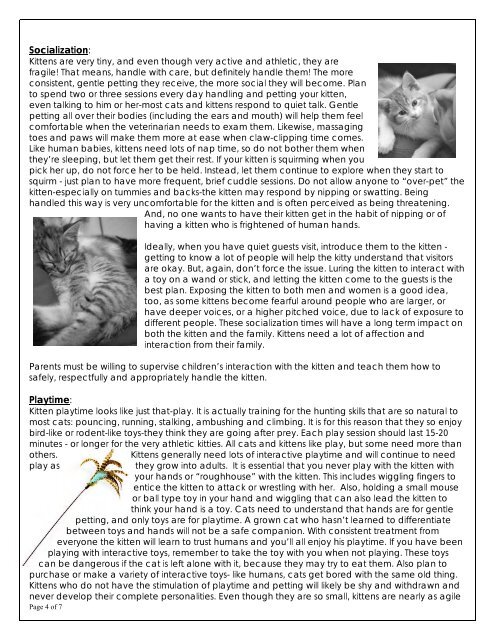Kitten Kindergarten - San Francisco SPCA
Kitten Kindergarten - San Francisco SPCA
Kitten Kindergarten - San Francisco SPCA
You also want an ePaper? Increase the reach of your titles
YUMPU automatically turns print PDFs into web optimized ePapers that Google loves.
Socialization:<br />
<strong>Kitten</strong>s are very tiny, and even though very active and athletic, they are<br />
fragile! That means, handle with care, but definitely handle them! The more<br />
consistent, gentle petting they receive, the more social they will become. Plan<br />
to spend two or three sessions every day handling and petting your kitten,<br />
even talking to him or her-most cats and kittens respond to quiet talk. Gentle<br />
petting all over their bodies (including the ears and mouth) will help them feel<br />
comfortable when the veterinarian needs to exam them. Likewise, massaging<br />
toes and paws will make them more at ease when claw-clipping time comes.<br />
Like human babies, kittens need lots of nap time, so do not bother them when<br />
they’re sleeping, but let them get their rest. If your kitten is squirming when you<br />
pick her up, do not force her to be held. Instead, let them continue to explore when they start to<br />
squirm - just plan to have more frequent, brief cuddle sessions. Do not allow anyone to “over-pet” the<br />
kitten-especially on tummies and backs-the kitten may respond by nipping or swatting. Being<br />
handled this way is very uncomfortable for the kitten and is often perceived as being threatening.<br />
And, no one wants to have their kitten get in the habit of nipping or of<br />
having a kitten who is frightened of human hands.<br />
Ideally, when you have quiet guests visit, introduce them to the kitten -<br />
getting to know a lot of people will help the kitty understand that visitors<br />
are okay. But, again, don’t force the issue. Luring the kitten to interact with<br />
a toy on a wand or stick, and letting the kitten come to the guests is the<br />
best plan. Exposing the kitten to both men and women is a good idea,<br />
too, as some kittens become fearful around people who are larger, or<br />
have deeper voices, or a higher pitched voice, due to lack of exposure to<br />
different people. These socialization times will have a long term impact on<br />
both the kitten and the family. <strong>Kitten</strong>s need a lot of affection and<br />
interaction from their family.<br />
Parents must be willing to supervise children’s interaction with the kitten and teach them how to<br />
safely, respectfully and appropriately handle the kitten.<br />
Playtime:<br />
<strong>Kitten</strong> playtime looks like just that-play. It is actually training for the hunting skills that are so natural to<br />
most cats: pouncing, running, stalking, ambushing and climbing. It is for this reason that they so enjoy<br />
bird-like or rodent-like toys-they think they are going after prey. Each play session should last 15-20<br />
minutes - or longer for the very athletic kitties. All cats and kittens like play, but some need more than<br />
others.<br />
<strong>Kitten</strong>s generally need lots of interactive playtime and will continue to need<br />
play as<br />
they grow into adults. It is essential that you never play with the kitten with<br />
your hands or “roughhouse” with the kitten. This includes wiggling fingers to<br />
entice the kitten to attack or wrestling with her. Also, holding a small mouse<br />
or ball type toy in your hand and wiggling that can also lead the kitten to<br />
think your hand is a toy. Cats need to understand that hands are for gentle<br />
petting, and only toys are for playtime. A grown cat who hasn’t learned to differentiate<br />
between toys and hands will not be a safe companion. With consistent treatment from<br />
everyone the kitten will learn to trust humans and you’ll all enjoy his playtime. If you have been<br />
playing with interactive toys, remember to take the toy with you when not playing. These toys<br />
can be dangerous if the cat is left alone with it, because they may try to eat them. Also plan to<br />
purchase or make a variety of interactive toys- like humans, cats get bored with the same old thing.<br />
<strong>Kitten</strong>s who do not have the stimulation of playtime and petting will likely be shy and withdrawn and<br />
never develop their complete personalities. Even though they are so small, kittens are nearly as agile<br />
Page 4 of 7
















